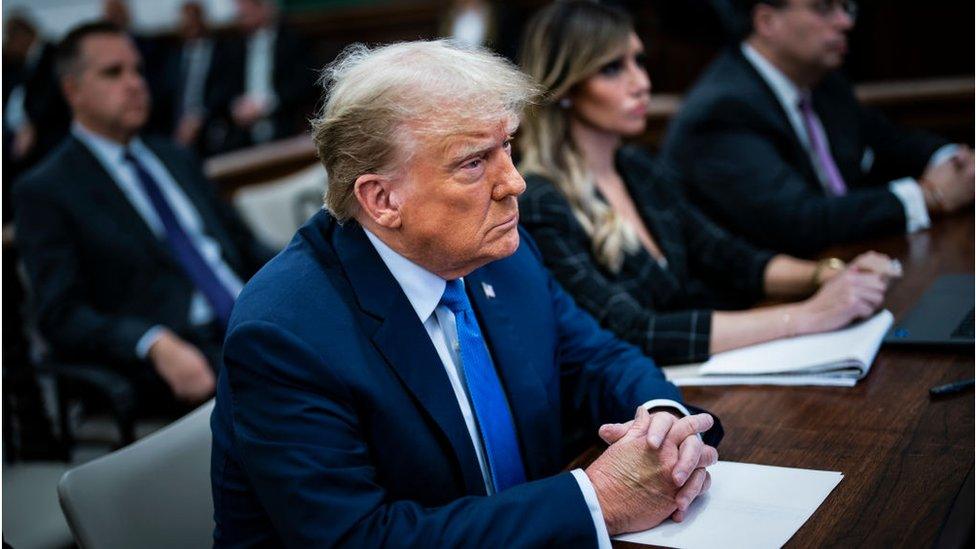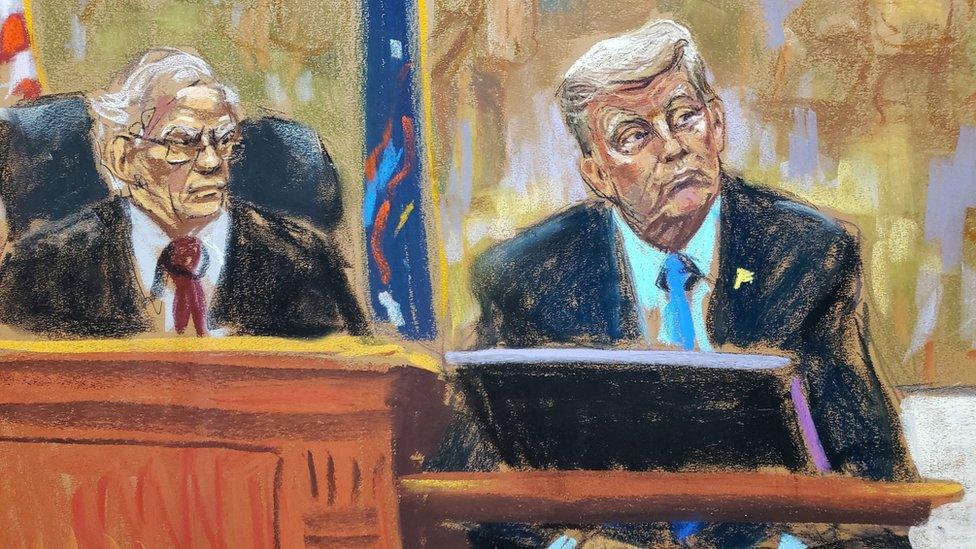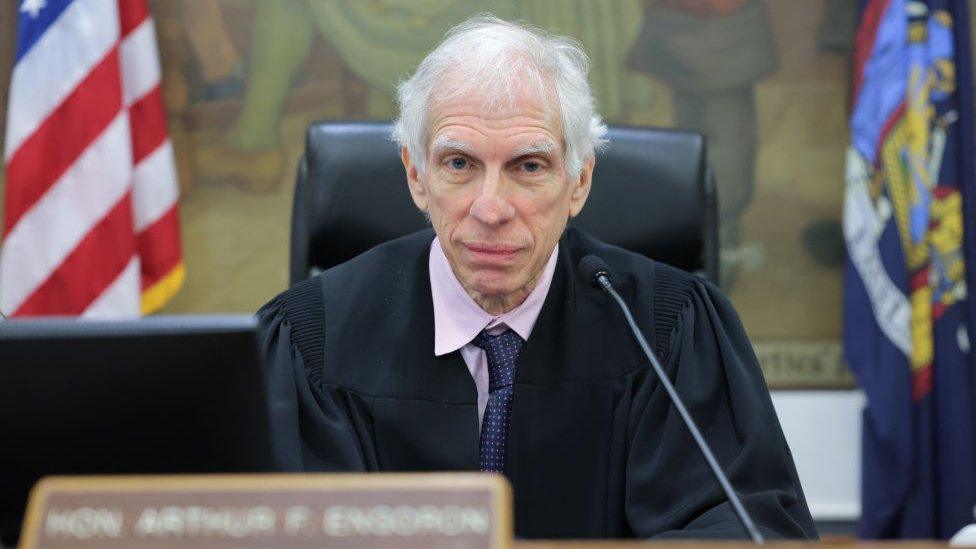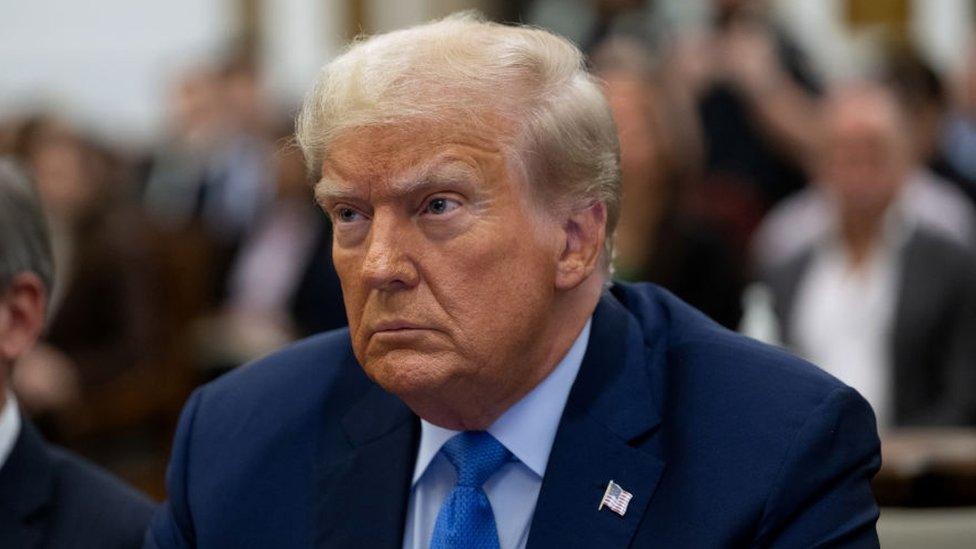Donald Trump: Legal experts see uphill battle in fraud case
- Published

This week marked the end of the most dramatic phase of Donald Trump's New York business fraud trial, which saw high-profile members of his family make the journey to Lower Manhattan one by one to answer probing questions from prosecutors.
On Monday Mr Trump's defence team will begin presenting their side, calling the former president's oldest son back to the stand as their first witness. But legal analysts told the BBC that after two damaging weeks of testimony from members of the Trump family, salvaging their case now will be a herculean task.
"It's been a disaster from a legal perspective," said Neama Rahmani, a former federal prosecutor and president of West Coast Trial Lawyers.
He believes that Mr Trump is "going to lose this case, and lose badly".
In a worst-case scenario for Mr Trump, Judge Arthur Engoron could bar him and his fellow defendants from doing business in New York, and issue fines of at least $250m (£204m) in penalties.
Perhaps the most harmful of all the testimony came from Mr Trump himself. When he took the stand on Monday, he called New York Attorney General Letitia James a "political hack", declared the case "a disgrace" and personally attacked Judge Engoron.
At several points, Judge Engoron demanded Mr Trump's lawyers rein in his behaviour, and answer the questions posed to him. If they did not, the judge pledged to "draw every negative inference that I can".
"If Donald Trump was anybody other than a person with Secret Service protection, he would have been jailed for contempt of court," said Mitchell Epner, an attorney who handles commercial litigation.
When he did directly respond to prosecutors' questions, Mr Trump did perhaps even more damage to his cause.
At the heart of the attorney general's lawsuit are documents known as statements of financial condition, the balance sheets that the Trump Organization used to demonstrate the value of its properties and Mr Trump's net worth so they could obtain loans and insurance rates.
The attorney general's office alleges those documents were fraudulently inflated to obtain deals they could not have received based on their true financials.
The judge had already ruled those documents were false. He is now weighing whether there was an intent to defraud, whether the defendants did so for personal gain, and other charges. The judge will also determine whether to issue penalties and if so, how severe.

Judge Arthur Engoron expressed frustration with some of Donald Trump's answers during testimony
On the stand, Mr Trump boasted that his properties like Mar-a-Lago and 40 Wall Street were in fact worth more than their value on paper, but acknowledged he believed at least one of his properties may have been overvalued.
At another point, a prosecutor questioned him about the size of his Trump Tower penthouse, which the company had claimed was over 30,000sq ft but really took up just over 10,000. Mr Trump first acknowledged he had believed the claimed square footage was "high" - but then began to throw around larger estimates of its size.
Over the course of his testimony, Mr Trump admitted he had given his input, and that some of those values on paper were wrong.
But he insisted that even if he did offer this input, he did not direct his accountants or employees on what valuations to use.
Mr Trump denies any wrongdoing and has accused the New York attorney general of waging a campaign of political persecution against him.
Speaking to reporters after Mr Trump testified, his attorney Alina Habba said he had "built a great company, it's worth a ton more than that statement of financial condition."
She added that Ms James, the attorney general, "doesn't know how to get out of it because her politics won't allow her."
His children, Donald Trump Jr, Eric Trump and Ivanka Trump, were all more composed in their testimony and took a different approach to that of their father. But they did not necessarily help the family's case.
Each one, in their own way, attempted to deflect the responsibility for the false documents onto the company's accountants and lawyers.
Mr Trump Jr said he was unfamiliar with the standard accounting guidelines to which companies like his must adhere. Eric Trump testified he was not involved with the creation of the statements of financial condition. Both are executive vice-presidents at the Trump Organization.
They stuck to this defence even as they were presented with various emails they sent or were copied on, or documents they signed, that contained information based on the false financial statements.
Ms Trump, who was not a defendant, tried to give prosecutors as little to work with as possible, repeatedly saying she could not recall documents they presented to her.
When confronted with emails that showed her discussing the terms of a loan Deutsche Bank was about to grant her father for a real estate project, Ms Trump stated she could not recall the exchanges.
Her declarations were unlikely to help, Mr Rahmani said. Mr Trump Jr and Eric Trump were "still liable for some of the claims like financial fraud, even if they didn't have intent", he observed.
And, he added, the Trump Organization was liable for the actions of Donald Trump and his sons in the course of their employment.
Legal experts agreed Mr Trump's defence team, led by veteran attorney Chris Kise, will be starting on the back foot next week.
They could attempt to introduce reams of new evidence or continue to prod and goad Judge Engoron to give them grounds for an appeal.
The lawyers spent the last few weeks attacking the judge over his alleged lack of impartiality. Other accusations of bias launched against Judge Engoron's clerk led to angry reprimands from the bench and a gag order on the attorneys themselves.
"I'm sure the judge will rule against me, because he always rules against me," Mr Trump said at one point on Monday.
Despite the aggressive attacks, experts told the BBC that Mr Trump's legal team had failed to undermine the state's case.
"The defence needs someone to get up there and justify these valuations," Mr Rahmani said. "Accountants, CPAs, real estate experts, appraisers. And they just haven't done that yet."
At this point, they face an uphill battle in salvaging their case, analysts told the BBC.
"The reason that they are in such a bad situation is that the judge has already found that the most important documents in this case were all false," Mr Epner said. "As of now, the judge has also been given an enormous amount of evidence to show that they were knowingly false, and provided with the intent to defraud."
"Since they don't have the ability to get into a Back to the Future DeLorean and turn back time," Mr Epner said of the defence team, "I can't imagine what they can do to turn around this case."
Watch: Trump's New York fraud case explained... in 60 seconds
- Published22 March 2024

- Published7 November 2023

- Published6 November 2023
